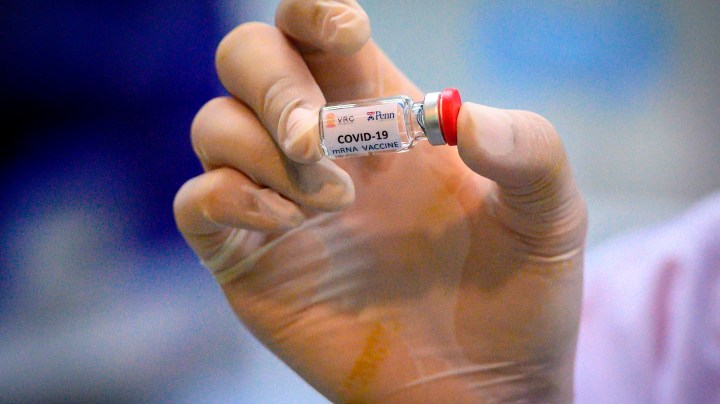
What kind of marketing will it take to get people on board with a COVID-19 vaccine?
What kind of marketing will it take to get people on board with a COVID-19 vaccine?

A poll from The Associated Press-NORC Center for Public Affairs Research found that 1 in 5 people would refuse a coronavirus vaccine. Of that group, 7 in 10 people are worried about the safety of a vaccine if one or several get approved soon. There is, clearly, a question of trust here.
As part of our “Fast Track” series about the huge challenge of getting a vaccine to people, “Marketplace Morning Report” host David Brancaccio consulted Glen Nowak, a professor and director of the Center for Health and Risk Communication at the University of Georgia. The following is an edited transcript of their conversation.
David Brancaccio: Whenever we get access to a coronavirus vaccine — later this year on the president’s timeline, middle of next year for widespread access, according to the current director of the Centers for Disease Control — you’ve seen these polls. Maybe 1 in 5 won’t be interested in getting the shot. What do you think is needed?
Glen Nowak: Well, to get people to get vaccinated, trust is often essential. And so it’s not actually surprising that that 1 in 5 would be expressing reluctance to get a vaccine, or get the COVID vaccine. Flu vaccine, it’s probably even higher than that.
Brancaccio: These trust issues are nettlesome. I mean, some may have the perception that the vaccine that’s not particularly safe might be pushed early, according to the presidential election calendar. Trust in medical authorities may have eroded. People haven’t forgotten that CDC people were telling people to avoid wearing masks early in the pandemic. And, you know, some public service announcements on radio, TV and online might not fix that trust problem.
Nowak: Well, I think what you seen is a couple of things. One is the National Institutes of Health has launched an ad campaign that is targeted at minorities to try to get more Hispanics and more African Americans, Black Americans, into clinical trials. So it’s people, everyday people, talking about what motivated them. That can be tremendously effective. And the good news in this country is that the vast majority of people still do trust their health care provider. And so, health care providers are going to play an essential role in terms of communicating and educating people about these vaccines. But for them to be able to do that, they also have to have a high degree of confidence in the safety and effectiveness of the vaccines that they’re recommending and providing.
Brancaccio: Getting a vaccine out was labeled Operation Warp Speed. Now I like my “Star Trek,” probably more than many, but some people may be thinking that speed is not everything when it comes to dealing with this.
Nowak: The problem with the word speed is that it sounds like you’re racing. And while there is a sense of a race here, the real issue is urgency. You want to convey the fact that this is an urgent undertaking. It’s not an undertaking where corners are being cut, or we’re going to be offering something before its time. You probably are going to want more data on the safety and effectiveness, and you’re not going to have good answers to some questions such as, how long will this vaccine protect us? Because that’s contingent upon how long you can look for that data.
There’s a lot happening in the world. Through it all, Marketplace is here for you.
You rely on Marketplace to break down the world’s events and tell you how it affects you in a fact-based, approachable way. We rely on your financial support to keep making that possible.
Your donation today powers the independent journalism that you rely on. For just $5/month, you can help sustain Marketplace so we can keep reporting on the things that matter to you.












